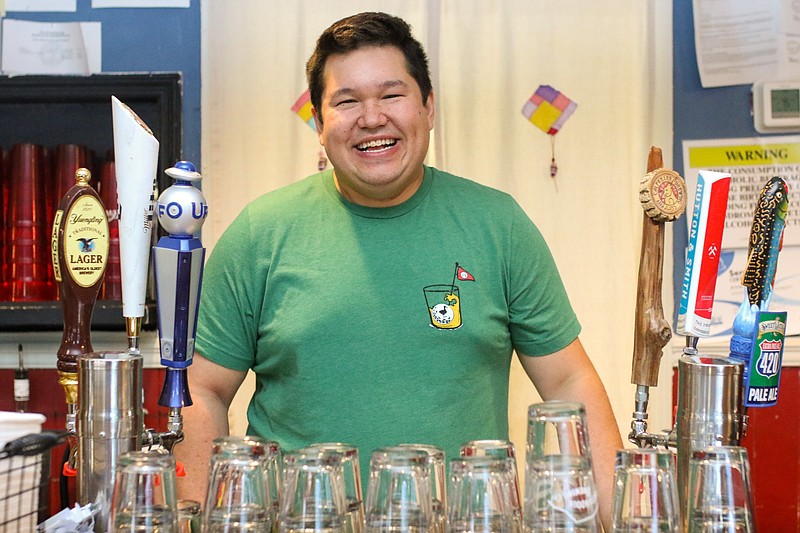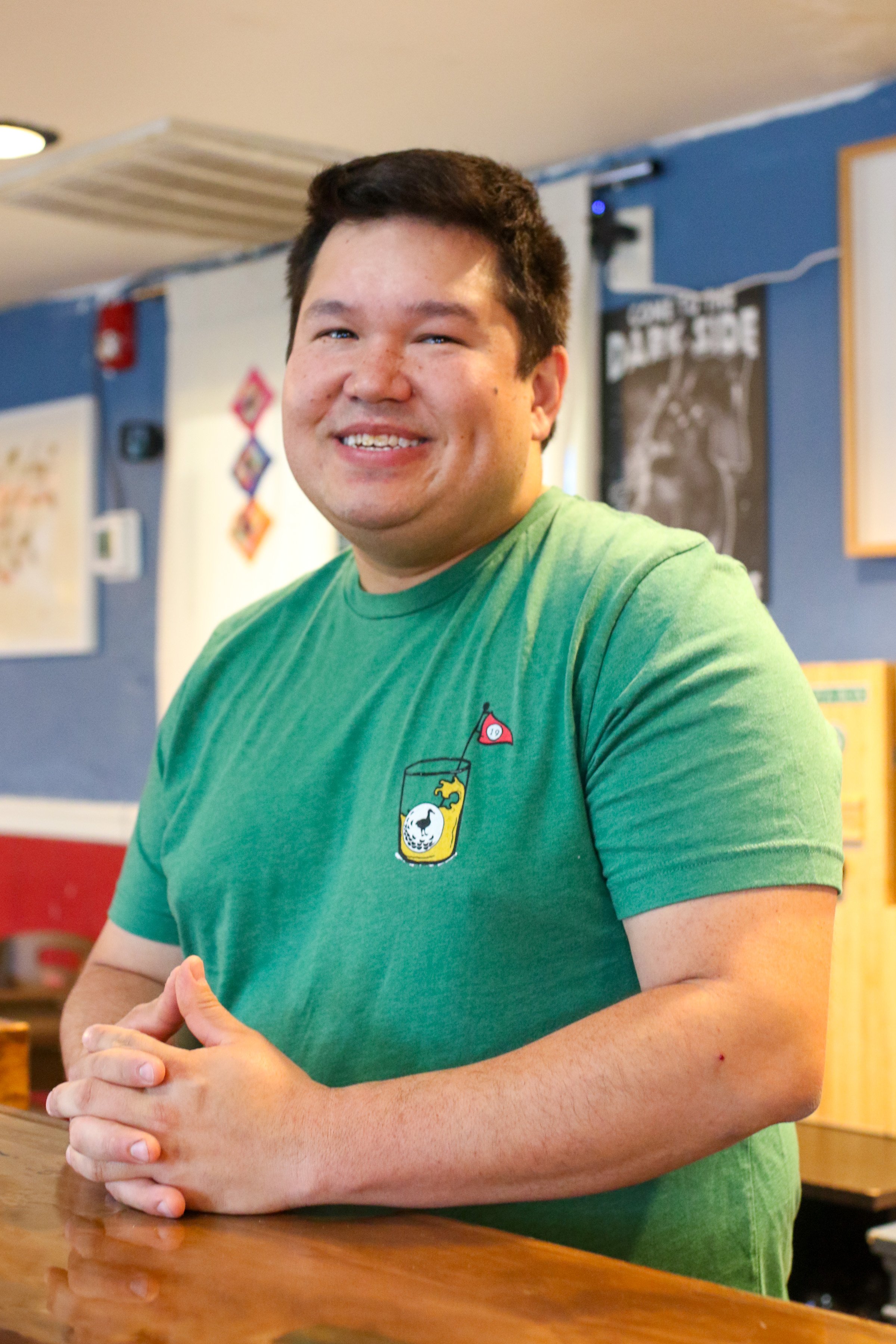David Sherrill's name doesn't sound like it comes out of South Korea. "Not even close," he adds. But his mother and grandmother are Korean, and it's from them that he developed the techniques and recipes to create what has become the go-to restaurant for Korean fare in Chattanooga, Han-Mi.
"Everything I have learned and am still learning comes from my mother and grandmother. All the original recipes come from my grandmother," he says.
Interestingly, Sherrill opened Han-Mi on June 25, 2020 -- 70 years to the day of the start of the Korean War.
"What luck!" he says sarcastically.
But luck is with him as soon as the doors open each day and people hungry for a change of fare stand ready to place their orders for mouthwatering dumplings, po' boys made Korean-style with tempura shrimp tossed in spicy tangy with gochujang mayo, or pork belly stir-fry.
(READ MORE: Chattanooga-area readers share their best restaurant meals of last year)
Here he answers questions about the ingredients, equipment and the inspirational YouTube quote that help him cook.
Q: What's the most-popular item on the menu?
A: It's definitely our Korean fried chicken with spicy, tangy sauce.
Q: What makes that fried chicken so good?
A: I can't tell you why because I don't know. I asked and sampled and can't find an answer. Maybe it's the combination of different starches, or maybe it's the sauce.
Q: How does Korean food differ from other Asian cuisines?
A: Gochujang and gochugaru -- red pepper paste and coarse red pepper. These two spices make up 90% of Korean dishes, which you don't find in other Asian cuisines.
(READ MORE: Where to find soju and soju cocktails in Chattanooga)
Q: Is it hard to find the ingredients you need in Chattanooga?
A: It's incredibly difficult, so I try to find alternatives.
Q: What was your very first job working in a restaurant? And what was the restaurant?
A: I was a dishwasher at T.G.I.Friday's.
Q: What's your earliest cooking memory?
A: When I was young, I remember my uncle taught me how to gut and to fillet a fish.
Q: How did your early years influence your decision to pursue a culinary career?
A: I was told I wasn't good at anything else.
Q: Whom do you consider your culinary mentor?
A: [British chef] Marco Pierre White. He had a quote that I saw on YouTube: "It's very easy to overwork something. It doesn't matter what your craft is. We tend to overwork, overthink and overanalyze everything. The secret is having confidence in what you do."
Q: What's the one tool in your kitchen you could not work without?
A: Scissors. Koreans must be able to cook with scissors. It's in our blood!
Q: What new restaurants are you excited about?
A: Shout-out to two up-and-coming cuisines/restaurants in Chattanooga: Spice Trail (Indian) and Ukko (multicultural). I can't wait for all of Chattanooga to discover you guys.
Q: How do you think Han-Mi fits into the growing culinary scene in the Southside area?
A: It's amazing how fast the culinary scene has blown up in Chattanooga over the last couple of years. We learned a tremendous amount from our first kitchen takeover in Oddstory Brewing. We never expected people to want to try Korean food. Kimchi stinks! But as soon as those doors opened -- boom -- we had people waiting. Then an hour later, we had a line out the door. I couldn't believe it. We ran out of food in two hours. We've seen a growing number of Chattanoogans wanting simple authentic Korean food. We realized Chattanooga was just looking for something different.
Q: Complete this sentence: If I hadn't become a chef, I would have been ...
A: A water conservationist, mostly working in the field of desalination.
Q: Does Han-Mi offer specials so you can make something different from time to time or is the menu pretty well set?
A: Yes and no. I change the menu every season because of changing prices on certain goods. Other than five items that are permanently on the menu, the rest changes depending on the season because of Korean tradition. Spring is more protein and vegetables. Summer usually serves lighter dishes and cold noodle broth to combat the heat. Fall starts the tradition of eating more noodles and bulking for winter since winter in Korea is harsh, and winter is meant for soups and more soups. Basically, only soups!
Q: What's one of your favorite recipes to make?
A: Dumplings. Big Korean Dumplings. Better known as "king-size" dumplings (Jjinppang-mandu). And they're filled with pork or beef -- it doesn't matter.
Big Korean Dumplings
For the dough:
1 cup warm water
1 teaspoon sugar
2 teaspoons dry yeast
1/2 teaspoon kosher salt
1 tablespoon vegetable oil
3 cups all-purpose flour
For the filling:
1 cup minced onion
1/2 cup minced carrot
1 1/2 cups minced zucchini
1 1/2 cups minced green onion (or Asian chives)
1 teaspoon Kosher salt
1 pound ground pork or beef
1 teaspoon soy sauce
4 finely minced garlic
1 teaspoon sugar
1 teaspoon sesame oil
1 teaspoon ground black pepper
Combine the warm water, sugar, dry yeast, salt and vegetable oil in a large bowl, and mix well until the dry yeast is fully dissolved. Add the flour, and mix it with a wooden spoon for 1 minute, then knead it for 2 to 3 minutes by hand. Cover and set aside in warm place until the dough doubles in size. Knead it again for 1 minute to remove any bubbles, and the dough turns smooth. Cover and set aside in warm place for 30 minutes.
Place the onion, carrot, zucchini and green onion in a large bowl. Add the salt, and mix it up by hand. Set aside for 10-15 minutes. Squeeze the excess water out with either a cheesecloth or by hand. Combine ground pork or beef, soy sauce, garlic, sugar, sesame oil and ground black pepper. Mix it by hand, and set aside.
Heat a large pan over medium-high heat. Sauté the meat mixture for 5 to 6 minutes, then transfer to a large bowl to cool in refrigerator.
Cut the dough into 16 small similar pieces. Take a few dough balls and put them on a floured cutting board. The rest of balls should be in the bowl with the lid closed to prevent them from drying out. Roll out each ball into a disk 4 inches in diameter. Place a disk into your palm, and add 3 tablespoons of mixture to the center of it. Lift the edges of the disk up around the filling, then press the edges together to seal the filling snugly inside.
Put 6-7 cups of water in the bottom of a large streamer, and place each dumpling on the rack. Place cheesecloth or paper towel on top to separate from direct steam. Steam over high heat for 20 minutes. Makes 16 dumplings.
If you go
— Where: Han-Mi, 3103 Broad St.
— Entree price range: $12-$18
— Hours: 11 a.m.-8 p.m. Tuesday-Wednesday, 11 a.m.-9 p.m. Thursday-Friday, noon-9 p.m. Saturday, noon-8 p.m. Sunday
— Phone: 423-541-7273
— Online: hanmichatt.com
Contact Anne Braly at abraly@timesfreepress.com or annebraly.com.

